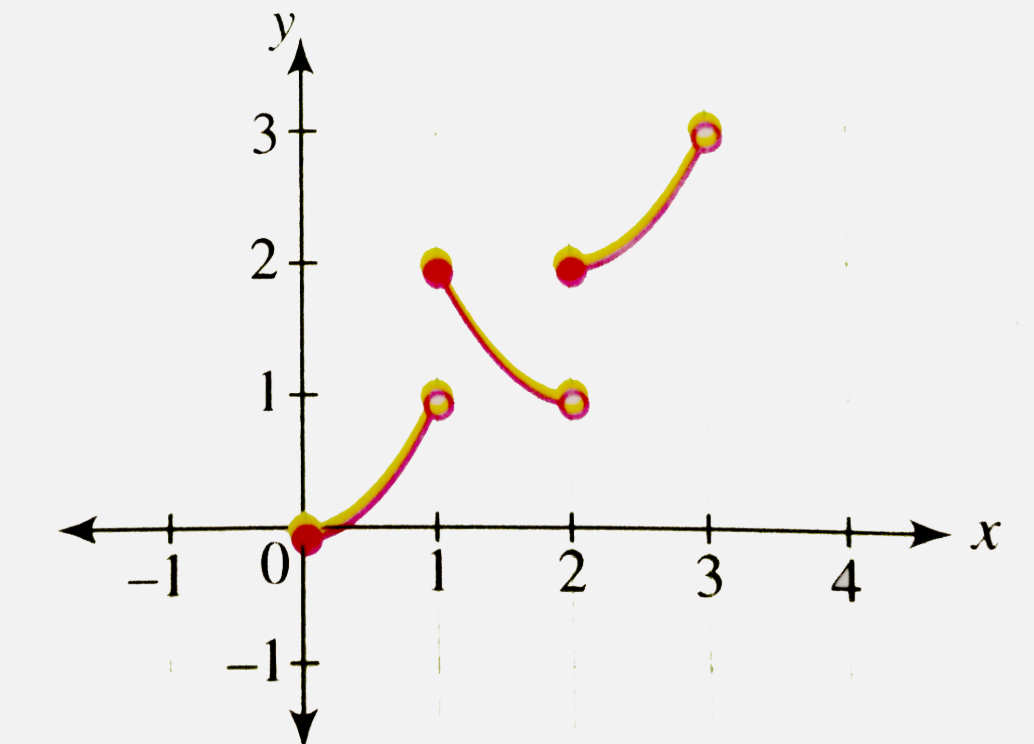If F(x)andG(x) are even and odd extensions of the functions f(x)=x|x|+sin|x|+xex, where x∈(0,1),g(x)=cos|x|+x2−x, is where x∈(0,1) respectively to the ars interval (−1,0) then F(x)+G(x)in (−1,0) is Solution in Tamil
sinx+cosx+xe−x
−(sinx+cosx+xe−x)
−(sinx+cosx+x+xe−x)
−(sinx+cosx+x2+xe−x)
The correct Answer is:C
f(x)=f(−x) where f(x)=x|x|+sin|x|+xex,
∴ F(x)=x2−sinx−xe−x (i)
Also, g(x)=−g(−x), where g(x)=cosx+x2−x
∴ G(x)=−(cosx+x2+x)=−cosx−x2−x (ii)
∴ F(x)+G(x)=−sinx−xe−x−cosx−x
=−(sinx+cosx+x+x+ex−x)
Topper's Solved these Questions
- BOOK - CENGAGECHAPTER - FUNCTIONSEXERCISE - Multiple Correct Answers Type10videos
FUNCTIONS
- BOOK - CENGAGECHAPTER - FUNCTIONSEXERCISE - Comprehension Type7videos
FUNCTIONS
- BOOK - CENGAGECHAPTER - EQUATION OF PLANE AND ITS APPLICATIONS -IIEXERCISE - DPP 3.418videos
EQUATION OF PLANE AND ITS APPLICATIONS -II
- BOOK - CENGAGECHAPTER - GETTING STARTED WITH GRAPHSEXERCISE - Exercise18videos
GETTING STARTED WITH GRAPHS
Similar Questions
The function f(x)=cos−1⎛⎝2[|sinx|+|cosx|]sin2x+2sinx+114⎞⎠ is defined if x belongs to (where [.] represents the greatest integer function)
04:11View SolutionLet f(x)=x2−2x−1∀x∈R Let f:(−∞,a]→[b,∞), where a is the largest real number for which f(x) is bijective. If f:R→R , g(x)=f(x)+3x−1 , then the least value of function y=g(|x|) is
08:49View SolutionLet A(0,6,6), B(6,6,0) and C(6,0,6) are three points and point D is moving on the line x+z−3=0=y. If G is centroid of ΔABC, then minimum value of GD is
03:39View SolutionDoes the following graph pass the vertical or horizontal line test ?
 03:04View Solution
03:04View Solutionf(x)={g(x)*cos((1)/(x)) if x!=0 and 0 if x=0, where g(x) is an even function differentiable at x=0 passing through the origin then f'(0)
08:46View SolutionIf F(x) and G(x) are even and odd extensions of the functions f(x)=x|x|+sin|x|+xe^(x), where x in(0,1),g(x)=cos|x|+x^(2)-x, is where x in(0,1) respectively to the ars interval (-1,0) then F(x)+G(x) in (-1,0) is
View SolutionLet g(x)=1+x-[x] and f(x)=-1 if x 0, then f|g(x)]=1x>0
View Solutionf(x)={x-1,-1<=x<=0 and x^(2),0<=x<=1 and g(x)=sin x Find h(x)=f(|g(x)|)+|f(g(x))|.
07:31View SolutionLet f(x)={x-1,-1<=x<0 and x^(2),0<=x<=1,g(x)=sin x and h(x)=f(|g(x)|)+[f(g(x)) Then
07:34View Solutiong(x)=xf(x), जहाँ
f(x)={xsin(1/x),x≠00,x=0
तब x=0 पर -02:39View SolutionLet f(x)=⎡⎢ ⎢ ⎢⎣π2.sin−1(1−x2)sin−1(1−{x})√2((x)−(x)3)for x≠0 π2x=0
where {x} is the fractional part of x. Consider another function g(x), such that
g(x)={f(x)forx≥02√2f(x)forx<0
Discuss the continuity of the function f(x) & g(x) at x=0.02:34View SolutionLet g(x)=xf(x), where f(x)={x2sin.1x:x≠00:x=0. At x=0,
02:25View Solutionमाना, g(x) = xf(x), जहाँ f(x)={x2sin1x:x≠00:x=0 है। x = 0 पर,
05:17View Solutiong(x)=xf(x), where f(x)=xsin1x,x≠0=0,x=0. At x=0:
View SolutionIf f(x)=(g(x))+g(−x)2+2[h(x)+h(−x)]−1 where g and h are differentiable functions then f'(0)
04:07View SolutionIf F(x)andG(x) are even and odd extensions of the functions f(x)=x|x|+sin|x|+xex, where x∈(0,1),g(x)=cos|x|+x2−x, is where x∈(0,1) respectively to the ars interval (−1,0) then F(x)+G(x)in (−1,0) is
04:54View Solution

